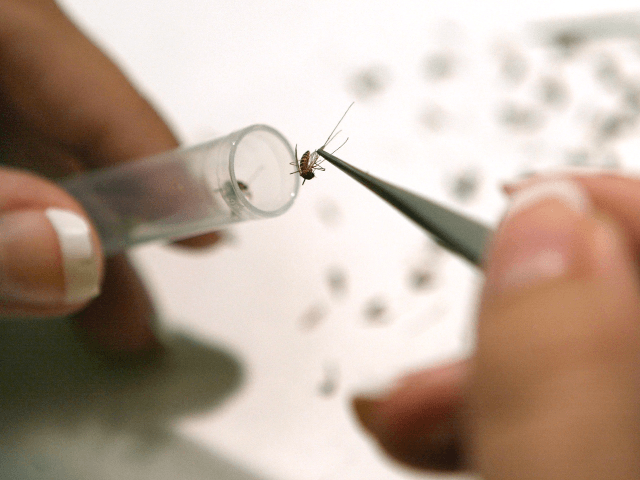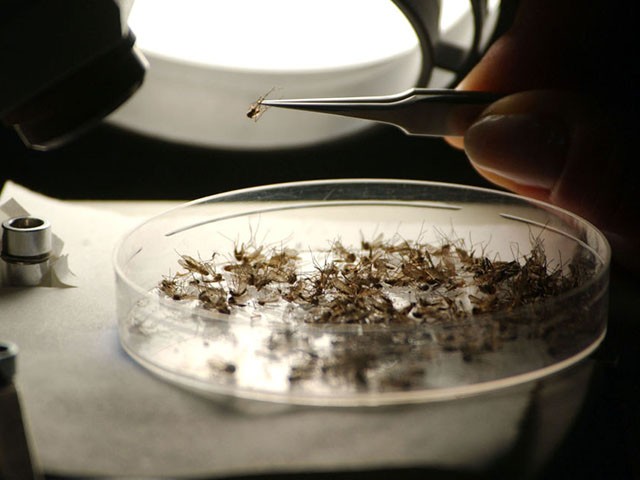China Experiments with Spreading Vaccines Through Mosquitoes

Chinese scientists are reportedly looking at a technique for using mosquito bites to distribute vaccines. The experiment was conducted on animals, but the possibilities for human exposure are obvious and ominous.
The South China Morning Post (SCMP) on Wednesday quoted a paper from the Chinese Academy of Sciences that described a plan to send genetically-modified mosquitoes into the wild, where they would bite animals to trigger a “strong, long-lasting immune response.”
The authors of the paper said their trials had been successful at making animal subjects more resistant to viral infections, most notably Zika, which was the big viral panic in the late 2010s before a certain other organism emerged from Wuhan, China, to rampage across the world.
Zika is spread primarily by the Aedes aegypti mosquito, a wide-ranging pest that breeds in swamps around the world, including the United States. The Zika crisis was particularly acute in Brazil, where pregnant women feared a mosquito bite could lead to birth defects or miscarriage from the virus.

Isabela Cristina, 18, who is six months pregnant, shows a photo of her ultrasound at the IMIP hospital in Recife, Pernambuco state, Brazil, Wednesday, Feb. 3, 2016 amid a Zika virus outbreak, spread by the Aedes aegypti mosquito. (AP Photo/Felipe Dana)
Several proposals made over the past decade to fight Zika involved genetically modifying mosquitoes, usually with an eye toward neutering them and causing the populations to collapse as they stopped breeding.
The Chinese researchers essentially combined Zika with another virus called Chaoyang or CYV, which thrives in mosquitoes but not in larger animals, producing a harmless hybrid virus that tricks the immune systems of animals into thinking they have been infected with Zika. The animals would then develop immunity to Zika and related viruses without ever actually suffering an infection.
According to the paper cited by the SCMP, the team at the Chinese Academy of Sciences fed blood laced with the inert CYV-Zika hybrid to mosquitoes, which proceed to bite laboratory mice, passing the virus to them through the saliva. The mice developed useful antibodies that lasted for more than five months, allowing them to survive normally fatal doses of Zika virus injected by the research team. Also, the mice did not pass Zika back to “clean” mosquitoes that bit them after they were infected.
“Each mouse was bitten up to three times by 30 different mosquitoes, to simulate natural conditions,” the SCMP noted. This exposure is roughly equivalent to the experience of a human playing tennis in Florida for half an hour on a summer afternoon.
The Chinese team anticipated using their mosquito inoculation technique for “control of zoonotic diseases infecting domestic animals and humans,” as well as for “protection of endangered wildlife, such as ruffled grouse decreased by West Nile virus.”

NORTHAMPTON, NH – JUNE 9: An entomologist identifies mosquito species at Dragon Mosquito Control June 9, 2005 in Northampton, New Hampshire as authorities anticipate a mosquito explosion, some of which carry the West Nile Virus and Eastern Equine Encephalitis (EEE). Last year EEE killed three people in the state of Massachusetts. (Photo by Darren McCollester/Getty Images)
The implication is that mosquito-based vaccine distribution would be used on animals in the wild, preventing them from developing viruses that could be passed along to humans. Chinese scientists generally claim that is how the Wuhan coronavirus pandemic began, despite their remarkable difficulty in producing supporting evidence. The Chinese government, on the other hand, officially claims the coronavirus was created by the U.S. Army at a laboratory at Ft. Detrick, Maryland and spread to China by either American service members or frozen fish products.
Mosquitoes have stubbornly resisted all entreaties to refrain from biting humans and the thought of Chinese researchers releasing clouds of virus-laden mosquitoes from their notoriously insecure laboratories would cause great apprehension both inside and outside of China.
One of the big reasons Beijing struggled to get its most vulnerable populations to accept vaccinations is that a string of pharmaceutical-industry scandals left them deeply suspicious of the Chinese medical industry.
The idea of using mosquitoes as tiny flying vaccinators is not new. In 2010, a group of Japanese researchers genetically engineeredmosquitoes that could inject vaccines into humans through tiny drops of saliva. The project focused on using a breed of malarial mosquito to dispense vaccinations against a parasitic disease called leishmaniasis that is normally spread by sand flies.
As with the new Chinese experiment described by the South China Morning Post, the Japanese team dispatched clouds of pet mosquitoes to bite laboratory mice dozens of times, and pronounced themselves satisfied with the rate of vaccine transmission. Researchers around the world declared the experiment a “fascinating proof of concept,” and talked about the idea of using mosquitoes to vaccinate wild animals, but backed away from using “flying syringes” on humans.
In September 2022, the University of Washington in Seattle conducted a clinical trialthat involved using genetically-modified mosquitoes to inject live malarial parasites into human skin. The parasites were also genetically modified to keep the subjects from getting sick. As with the Chinese experiment, the goal was to provoke the bodies of the subjects to develop an immune response.
The Seattle experiment did not involve releasing mosquitoes into the wild. Instead, the subjects were instructed to place their arms over a box filled with hundreds of mosquitoes and covered with a fine mesh. The mosquitoes gleefully bit the human skin pressed against the mesh, delivering the modified parasites while causing a good deal of swelling and blistering. One of the subjects said the mosquito box was “literally a Chinese food takeout container.”
“We use the mosquitoes like they’re 1,000 small flying syringes,” said Dr. Sean Murphy of the University of Washington, reviving the unfortunate metaphor from the Japanese experiment in 2010.
The Seattle trial was not conducted with an eye toward distributing vaccines through the mosquito population. Instead, the mosquitoes were used as a more cost-effective means of injection, because the malarial parasites were difficult to administer with needles.
The results were not quite a roaring success, as only some of the participants gained protection from malaria and it only lasted for a few months, but researchers said it was a “promising” first step toward both using genetically-modified parasites to inoculate against malaria, and using mosquitoes to deliver the inoculations.


No comments:
Post a Comment